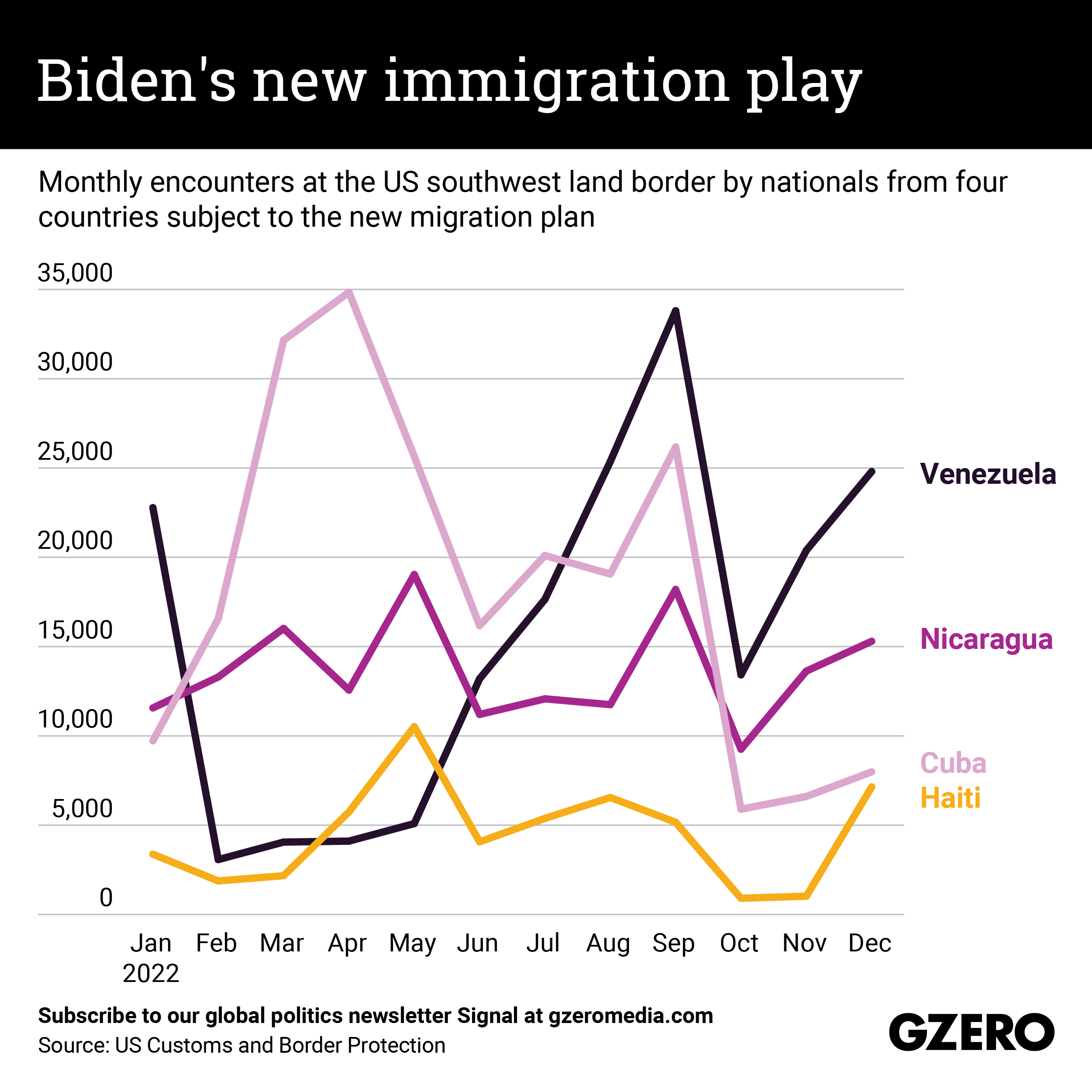Immigration is always a divisive political issue, but it’s been particularly loaded for President Joe Biden, who has seen a record number of migrants fleeing political and economic crises in Latin America arrive at the US southern land border under his watch. To address this issue – used as a cudgel by Republicans – Biden recently announced a new immigration policy, whereby migrants from Nicaragua, Haiti, Cuba, in addition to Venezuela, would be eligible for “parole” – meaning temporary two-year work visas – only if they apply for asylum from outside the US. Mexico, for its part, has agreed to take in 30,000 migrants each month from these countries expelled by the US. How many people will this plan impact? We take a look at monthly migrant arrivals from these four countries in 2022.
☰
More from GZERO Media
Graphic Truth: Turkey is cheaper, but inflation still gobbles
November 26, 2025
Eileen Zhang
US President Donald Trump pardons a turkey at the annual White House Thanksgiving Turkey Pardon in the Rose Garden in Washington, D.C., USA, on Nov. 25, 2025.
Andrew Leyden/NurPhoto
Although not all of our global readers celebrate Thanksgiving, it’s still good to remind ourselves that while the world offers plenty of fodder for doomscrolling and despair, there are still lots of things to be grateful for too.
Russian President Vladimir Putin welcomes US envoy Steve Witkoff during a meeting in Moscow, Russia, on April 25, 2025.
Sputnik/Kristina Kormilitsyna/Pool via REUTERS
Palestinians walk in the rain at a makeshift camp in Gaza City, on Nov. 25, 2025.
Majdi Fathi/NurPhoto
Hard Numbers: France’s Bardella would win an election today, Trump’s support among Latinos falls, Fox hunts for a seat in the Bahamas, and Hitler returns
November 25, 2025
Marine Le Pen, French member of parliament and parliamentary leader of the far-right National Rally (Rassemblement National - RN) party and Jordan Bardella, president of the French far-right National Rally (Rassemblement National - RN) party and member of the European Parliament, gesture during an RN political rally in Bordeaux, France, September 14, 2025.
REUTERS/Stephane Mahe
Army Chief Asim Munir holds a microphone during his visit at the Tilla Field Firing Ranges (TFFR) to witness the Exercise Hammer Strike, a high-intensity field training exercise conducted by the Pakistan Army's Mangla Strike Corps, in Mangla, Pakistan, on May 1, 2025.
Inter-Services Public Relations (ISPR)/Handout via REUTERS
Field Marshal Asim Munir, the country’s de facto leader, consolidated his power after the National Assembly rammed through a controversial constitutional amendment this month that grants him lifelong immunity from any legal prosecution.
What We’re Watching: Russia and Ukraine negotiations continue, Trump and Xi make a springtime date, Sudan’s rebels declare unilateral ceasefire
November 25, 2025
Ukraine's President Volodymyr Zelenskiy and U.S. Army Secretary Daniel Driscoll attend a meeting, amid Russia's attack on Ukraine, in Kyiv, Ukraine, November 20, 2025.
Ukrainian Presidential Press Service/Handout via REUTERS
- YouTube
In this “ask ian,” Ian Bremmer tackles a growing question: How is the Trump administration performing as the year wraps up?
© 2025 GZERO Media. All Rights Reserved | A Eurasia Group media company.
